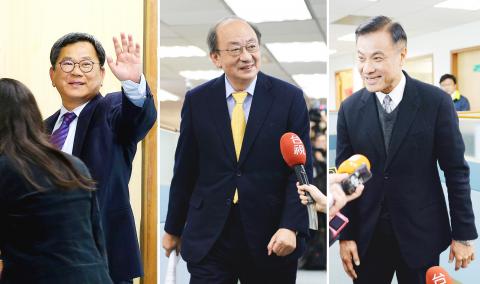While president-elect Tsai Ing-wen (蔡英文) said she would respect the Democratic Progressive Party (DPP) caucus’ choice of legislative speaker for the incoming legislature, it has been widely predicted that DPP legislator-elect Su Jia-chyuan (蘇嘉全) is likely to be named to the role.
Tsai yesterday reaffirmed her stance on speaker selection as she attended a DPP caucus meeting at the Legislative Yuan, which media described as her supervising selection, but Tsai said her attendance at the first meeting of a new caucus was routine.
She urged caucus members to live up to the public’s expectations and spend time reviewing bills and focusing on transparency, reform, unity and public participation.

Photos: Taipei Times and CNA
“Whether the reshuffled Cabinet, led by incoming premier Simon Chang (張善政), is of a caretaker nature or not, it should perform its duties and the DPP caucus should participate in its supervisory role while respecting the newly appointed Cabinet to help stabilize the political situation,” Tsai said.
The three speculated to be in the running for the speaker position, including Su, and legislators Ker Chien-ming (柯建銘) and Chen Ming-wen (陳明文), expressed deference to Tsai’s opinions and the caucus, while Ker said that the selection of three caucus leaders is also a concern, which could affect the balance between the administrative and legislative branches.
“The stability of the Tsai administration depends on the legislature, so ending bipartisan fighting between the DPP and the Chinese Nationalist Party [KMT] would be pivotal in smoothing the DPP’s rule,” Ker said.
Su is the most favored candidate, as the legislative speaker has to remain neutral and will not attend party events, while Su has more support among the 18 elected legislators-at-large than Ker, Su’s strongest competitor.
Su has been in close cooperation with Tsai, and served both as her running mate in the 2012 presidential election and campaign executive director in this year’s election.
Ker is a senior lawmaker who took his seat in 1993 and the current DPP caucus whip, and is experienced in conducting cross-party negotiations.
“Ker and Chen would be in their element if they assume leadership in the caucus, while they would be hamstrung by the neutrality of speakership,” the party source said.
The DPP caucus said a straw poll would be conducted tomorrow if the speaker and deputy speaker selection could not be decided by negotiation.
Meanwhile, while DPP Legislator Tsai Chi-chang (蔡其昌) is believed to have been appointed as the caucus’ deputy speaker, the party is considering making way for younger politicians.
Tsai Chi-chang said Tsai Ing-wen should evaluate the candidates by their ability to carry out legislative reform and their public reception, while the DPP caucus voluntarily prioritized her opinion, as the DPP could not afford failure after it returned to power.
He said clearer messages would surface in these few days, and there is little chance the selection of speakership and caucus leadership would go to vote.
“The paring of Su and Tsai Chi-chang has a staunch support base and is believed to cause less friction in the new legislature,” the party source said.
In addition, DPP Legislator Kuan Bi-ling (管碧玲) is believed to be in line to run for Kaohsiung Mayor Chen Chu’s (陳菊) job after Chen Chu finishes her term in two years. Kuan has been silent whenever her name is mentioned in the speakership race, the party source said.

A preclearance service to facilitate entry for people traveling to select airports in Japan would be available from Thursday next week to Feb. 25 at Taiwan Taoyuan International Airport, Taoyuan International Airport Corp (TIAC) said on Tuesday. The service was first made available to Taiwanese travelers throughout the winter vacation of 2024 and during the Lunar New Year holiday. In addition to flights to the Japanese cities of Hakodate, Asahikawa, Akita, Sendai, Niigata, Okayama, Takamatsu, Kumamoto and Kagoshima, the service would be available to travelers to Kobe and Oita. The service can be accessed by passengers of 15 flight routes operated by

Chinese spouse and influencer Guan Guan’s (關關) residency permit has been revoked for repeatedly posting pro-China videos that threaten national security, the National Immigration Agency confirmed today. Guan Guan has said many controversial statements in her videos posted to Douyin (抖音), including “the red flag will soon be painted all over Taiwan” and “Taiwan is an inseparable part of China,” and expressing hope for expedited reunification. The agency last year received multiple reports alleging that Guan Guan had advocated for armed reunification. After verifying the reports, the agency last month issued a notice requiring her to appear and explain her actions. Guan

GIVE AND TAKE: Blood demand continues to rise each year, while fewer young donors are available due to the nation’s falling birthrate, a doctor said Blood donors can redeem points earned from donations to obtain limited edition Formosan black bear travel mugs, the Kaohsiung Blood Center said yesterday, as it announced a goal of stocking 20,000 units of blood prior to the Lunar New Year. The last month of the lunar year is National Blood Donation Month, when local centers seek to stockpile blood for use during the Lunar New Year holiday. The blood demand in southern Taiwan — including Tainan and Kaohsiung, as well as Chiayi, Pingtung, Penghu and Taitung counties — is about 2,000 units per day, the center said. The donation campaign aims to boost

The Central Weather Administration (CWA) said a magnitude 4.9 earthquake that struck off the coast of eastern Taiwan yesterday was an independent event and part of a stress-adjustment process. The earthquake occurred at 4:47pm, with its epicenter at sea about 45.4km south of Yilan County Hall at a depth of 5.9km, the CWA said. The quake's intensity, which gauges the actual effects of a temblor, was highest in several townships in Yilan and neighboring Hualien County, where it measured 4 on Taiwan's seven-tier intensity scale, the CWA said. Lin Po-yu (林柏佑), a division chief at the CWA's Seismological Center, told a news conference